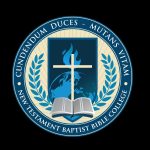TLLS101-LOOKING FOR THE LAMP

About Course
🛠 Christian Worker’s Education Certificate
Designed for foundational training in ministry practice, this certificate is awarded to students who successfully complete:
Study and practicum for Booklets #100–#119 and #200–#209
A 1,500-word reflection essay This credential affirms readiness to serve effectively in local church and outreach contexts.
Course Content
I. Rediscovering the Lamp – “Thy word is a lamp unto my feet, and a light unto my path.” – Psalm 119:105
-
📚 Lesson Highlights
II. Anchored in God’s Integrity – “The words of the LORD are pure words… Thou shalt preserve them.” – Psalm 12:6–7
III. When God Speaks, He Expects Action – “Study to shew thyself approved unto God…” – 2 Timothy 2:15
IV. Discernment by Purity – “Every word of God is pure: he is a shield unto them that put their trust in him.” – Proverbs 30:5
V. Weighing the NIV Against God’s Standard – “Every word of God is pure…” – Proverbs 30:5
VI: Measuring Purity by Doctrinal Impact – “Every word of God is pure…” – Proverbs 30:5
VII: Discerning Symbols, Word Removal, and Doctrine – “Every word of God is pure…” – Proverbs 30:5
VIII: When Scholars Say “There Is No Perfect Bible” – “The words of the LORD are pure words… Thou shalt keep them, O LORD.”
IX: Old Doesn’t Always Mean Pure – “…thou shalt carry up my bones hence from hence.” – Exodus 13:19
X: Faulty Foundations Cannot Support Pure Doctrine – “Every word of God is pure…” – Proverbs 30:5
XI: The Men Behind the Manuscripts – “If the foundations be destroyed, what can the righteous do?” – Psalm 11:3
XII: Where the Church Trusted the Text “And the disciples were called Christians first in Antioch.” – Acts 11:26
XIII: God’s Hebrew Line of Preservation – “The grass withereth, the flower fadeth: but the word of our God shall stand forever.” – Isaiah 40:8
XIV: God’s Greek Line of Preservation – “Heaven and earth shall pass away, but my words shall not pass away.” – Matthew 24:35
XV: God’s Blueprint for Preservation – “Every word of God is pure: he is a shield unto them that put their trust in him.” – Proverbs 30:5
XVI: How God Translates His Word – “Take thee a roll of a book, and write therein all the words that I have spoken unto thee.” – Jeremiah 36:2
XVII: Can God’s Word Survive Destruction? – “…he cut it with the penknife, and cast it into the fire… until all the roll was consumed.” – Jeremiah 36:23
XVIII: Divine Inspiration, Preservation, and Addition – “The word of the LORD came to Jeremiah…” – Jeremiah 36:27
XIX: God’s Refining Furnace for His Word – “The words of the LORD are pure words: as silver tried in a furnace of earth, purified seven times.” – Psalm 12:6
XX: The Judgment and the Judged – “Add thou not unto his words, lest he reprove thee, and thou be found a liar.” – Proverbs 30:6
XXI: Confirming the Divine Fingerprint on the KJV -“The words of the LORD are pure words: as silver tried in a furnace of earth, purified seven times.” – Psalm 12:6
Earn a certificate
Add this certificate to your resume to demonstrate your skills & increase your chances of getting noticed.

Student Ratings & Reviews

No Review Yet
